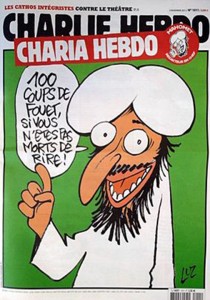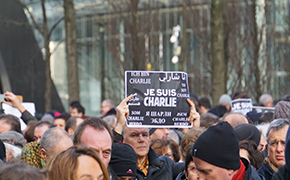A recent attack in Paris on the offices of Charlie Hebdo has widened religious tensions and stimulated global protests.
What Happened
The morning of Jan. 7 commenced three days of terror in Paris following an attack on Charlie Hebdo, a satirical weekly French magazine. Gunmen Cherif and Said Kouachi killed a total of 12 people and accredited their violent actions to avenging Prophet Muhammad, who is revered by Muslims as the final messenger of God.
But this was not the first threat against the magazine. In 2006, Charlie Hebdo gained infamy in Muslim countries after publishing a front-cover image of Prophet Muhammad sobbing into his hands, with the caption “Mahomet débordé par les intégristes” (“Muhammad overwhelmed by fundamentalists”). The remainder of the paper contained

12 cartoons of the Prophet, which produced an onslaught of disapproval from Muslim individuals. Although the French Council for the Muslim Faith sued the weekly magazine, the court ultimately sided with Hebdo.
Exercising its freedom of press, the paper continued to print caricatures of Muhammad, despite growing resentment from Muslim communities. In Nov. 2011, the front page of an issue, headlined “100 lashes if you don’t die of laughter,” displayed a sketch of Prophet Muhammad and jokingly requested him to serve as “guest editor” of the paper. The following day, the Charlie Hebdo offices were firebombed. Later in the same year, the website was hacked after presenting yet another cartoon drawing of the Prophet, this time portraying him as gay.
In the recent Jan. 7 issue, a cartoon created by editor Stéphane Charbonnier noted that France had not yet experienced any terrorist attacks. “Still no attacks in France,” reads the title. “Wait! We have until the end of January to give our best wishes,” says the man in the drawing.
A mere five hours after the issue was released to the public, Charbonnier and his coworkers were shot.
Why It Happened
According to AP Comparative Religion teacher Steve Spencer, the attack could be attributed to the long-standing animosity between French and Muslim communities, but is not a byproduct of religious tensions.
“The conflict is really between historical groups associated with Islam, like the Ottoman Empire, versus the domination of the Church in Europe,” Spencer said. “The Islamic empires in the 11th through 14th centuries were prominent, wealthy and prosperous, and medieval Europe was looking at them in envy.”
Eventually, Europe rose to power as well, resulting in both political and economical power struggles, which had little to do with the respective religions of each empire. In fact, Spencer believes that people are quite surprised when they learn about the similarities between the basic teachings of Christianity and the fundamental values of Islam.
President of Model United Nations and senior Aneesha Bandarpalle hopes that the recent events in Paris will bring the true ideals of Islam to light.
“Majority of Muslim people are kind, everyday people,” Bandarpalle said. “I hope that because this has happened, it’ll open people’s eyes to see that majority of Muslims are not radicals like the terrorists were.”
Ever since France became a colonial power and first started controlling parts of North Africa, an increasing number of Muslims have immigrated to the country. But the integration of the two cultures has not been easy.
Upper School French teacher Catherine Berryman, who was born and raised in France, has recognized a growing cultural rift between the French and Muslims.
“A lot of the young people who grew up in the suburbs somehow don’t assimilate into the French society,” Berryman said. “They have a hard time getting into the school system and getting a job, and I think they’re feeling resentful. This creates a big imbalance.”
Spencer, too, noted that most individuals who are born into the North African Muslim community of France live in the poorest parts of town and are therefore unable to become “full-functioning, prosperous members of the society.”
While the French government has tried to change this by forcing companies to hire Muslims and removing pork items from school lunch menus, the efforts have not necessarily been effective.
According to Berryman, many of these Muslim citizens find other means of survival and as a result, end up in prison, where they are introduced to violent ideas.
“That’s what happened to one of the [Kouachi] brothers; that’s how he became an extremist,” she said.
The Daily Mail reported that the attackers were most likely trained by the Yemen-based Al Qaeda group, who claimed responsibility for the killings through a publicly released 11-minute video.
Without much governmental and societal support, the gap between French and Muslim peoples may only continue to grow. Spencer agrees that these immigrant Muslims have a right to be angry with their circumstances, but Islam is not a religion of anger.
“There are so many misconceptions,” Spencer said. “It’s based on complete ignorance and a total lack of understanding of the teachings and tenets of the religion. Muhammad promoted such a different kind of attitude; he was opposing those oppressive, discriminatory, hateful kinds of behaviors.”
What’s Happening Now
French citizens took to the streets on the night of Jan. 7 to pay respects to those killed in the attack. As an act of solidarity, social media users around the world began tweeting “Je suis Charlie,” translated “I am Charlie,” to display their support as the search for the attackers continued.
On the contrary, various peaceful protests, some turned violent, have broken out in African and Middle Eastern countries against Charlie Hebdo, as the newspaper continues to print images of Muhammad. CNN reported that the deadliest protest took place on Jan. 21 in Niger, where 10 people were killed and multiple homes and churches destroyed. Ten days later, anti- Charlie Hebdo protests in Kabul, Afghanistan resulted in violent confrontations between police and demonstrators.
Since the protests could grow more violent with each image of Muhammad that Charlie Hebdo releases, the question of “how far is too far” must be addressed.
Both America and France strongly believe in their values of free speech and freedom of the press. Although Berryman “felt attacked, just like the French did,” she believes that the magazine has a right to express its opinions, despite the danger and risk.
“I think they play a role in French politics,” she said. “You have the right to not buy the newspaper if you don’t want to see it. It’s not an easy yes or no question because clearly, there are some repercussions.”
According to Bandarpalle, these repercussions could include increased tension between religious communities, but she remains hopeful that time will heal all.
“In reality [this event] probably will worsen the gap,” she said. “But at Hockaday, we talk so much about feminism and women getting all of their rights — that’s kind of what I’m thinking about — it’s a process and it’ll hopefully happen eventually.”
While Western countries such as the United States are granted certain freedoms, Spencer believes that individuals can use their words as tools and therefore create less animosity between cultural and religious groups.
“I think it’s perfectly legitimate that people should criticize those [drawings] that are racist or discriminatory,” he said. “But people should not be killed over it.”
Recently, the magazine reported that it will not release its 1,179th edition on Feb. 4, which was the scheduled date. In fact, new editor-in-chief Gérard Biard has not yet set a date since the staff needs time to deal with grief, fatigue and overexposure to media attention that has resulted from the attack, according to NBC News.
– Inaara Padani, Copy Editor







